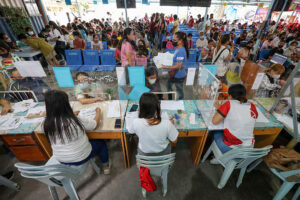Increased social development funding pushed
THE HOUSE of Representatives should look at increasing funding to agencies responsible for social development under the proposed P6.352-trillion national budget to spur inclusive socioeconomic growth next year, analysts said at the weekend.

By Kenneth Christiane L. Basilio, Reporter
THE HOUSE of Representatives should look at increasing funding to agencies responsible for social development under the proposed P6.352-trillion national budget to spur inclusive socioeconomic growth next year, analysts said at the weekend.
The budgets allotted to the Health, Social Welfare, Labor, Agriculture, and Trade and Industry departments are not enough to alleviate economic pressures faced by Filipinos, such as the rising costs of commodities, they added.
“The budgets for agriculture, agrarian reform and irrigation, trade and industry, education, health and social welfare remain seriously underfunded when measured against the magnitude of current problems,” Jose Enrique “Sonny” A. Africa, executive director at think tank IBON Foundation, said in a Viber message.
“Decent standards of living for all Filipinos because of universal social services and an economy with robust Filipino industry and vibrant agriculture are among the foundations for meaningful nation-building. The proposed 2025 budget is unfortunately not oriented toward this,” he added.
The Department of Budget and Management (DBM) in July submitted to the chamber its proposed P6.352-trillion national budget for 2025, which is equivalent to 22.1% of gross domestic product and 10.1% higher than the P5.768-trillion budget this year.
Under the 2025 National Expenditure Program, the DBM slashed the proposed budgets for agriculture, health, and social welfare by 4.7%, 7.6%, and 3.4%, respectively. Allocations for labor were also decreased by 26.1%, with trade and industry receiving a 3.9% cut.
“Most of the key departments that are crucial in boosting economic growth and promoting socio-economic development suffered cuts,” Zy-za Nadine M. Suzara, an independent budget analyst and former executive director of policy think-tank Institute for Leadership, Empowerment, and Democracy, said in a Viber message.
Ms. Suzara said the government was unable to provide bigger allocations to “marginalized sectors” such as agriculture and health for 2025 due to limited fiscal space resulting from bloated unprogrammed appropriations in the previous years.
BLOATED UNPROGRAMMED FUNDS
“The national budgets in the past three fiscal years are defective because the bicameral moved priority projects to unprogrammed appropriations, which are merely stand-by appropriations,” she said. “By placing them there, priority projects have lost guaranteed cash cover.”
Unprogrammed appropriations for 2024 ballooned by more-than-double to P731.45 billion from the proposed P281.91 billion as Congress shifted funding for education and social protection projects into it.
“Priority projects that were reallocated to unprogrammed appropriations in the 2024 budget are the foreign-assisted projects of DoTr (Department of Transportation) and DPWH (Department of Public Works and Highways), as well as portions of funding for education, health and social protection programs such as the Universal Access to Tertiary Education, PUV (Public Utility Vehicle) Service Contracting, various agri-fisheries programs,” she said.
The ballooning of unprogrammed appropriations in the previous budget “is a result of the surreptitious insertion by Congress of pork barrel funds,” Filomeno S. Sta. Ana III, coordinator of Action for Economic Reforms, said in a Viber message.
House Speaker and Leyte Rep. Ferdinand Martin G. Romualdez in August said the unprogrammed appropriations cannot be considered as pork barrel funds, citing differences in their technical definition.
The Priority Development Assistance Fund, colloquially known as pork barrel, is a discretionary lump sum fund to members of Congress meant to finance local projects within their legislative districts. It was discontinued in 2013 following the Philippines’ Supreme Court decision declaring it unconstitutional after state auditors found gross misuse in prior years.
Minority lawmakers from the Makabayan bloc in August called the ballooning of unprogrammed appropriations a new form of pork barrel with Party-list Rep. Raoul Danniel A. Manuel arguing it “bastardizes” the budget process and weakens congressional oversight on the budget.
“As a consequence of prioritizing pork in the previous years’ national budgets, the allocative efficiency of the 2025 proposed budget is compromised,” Ms. Suzara said. “The Marcos government is neither expanding more targeted and strategic socio-economic projects because of chronic inefficiency and underspending of many government agencies.”
Lawmakers should “temper their greed” to make the proposed 2025 national budget more efficiently allocated, according to Ms. Suzara.
PLENARY DEBATES
The House will begin plenary debates on the proposed budget on Monday, with a target of passing the budget bill by Sept. 25, Mr. Romualdez said in a statement on Sunday.
The committee on Tuesday last week finished reviewing the proposed budgets of each government agency, with the panel submitting the 2025 General Appropriations Bill for plenary deliberations on Thursday.
The 2025 GAB mostly retained the proposed expenditures submitted by the Budget department, with reallocations only happening to the Office of the Vice President’s proposed budget.
The House appropriations panel unanimously slashed the OVP’s budget by 64% to P733 million from P2.03 billion due to project redundancies with the Health and Social Welfare departments.
The reallocated amount would be equally split at P646 million between the Social Welfare departments aid program for indigent Filipinos and the Health departments medical assistance initiative.
“This is a reasonable budget reduction as it re-channels these funds toward agencies which can more directly serve Filipino families,” Terry L. Ridon, a public investment analyst and convener of think-tank InfraWatch PH, said in a Viber Message.
Congressmen are likely to augment funding for the Social Welfare and Public Works departments, Ms. Suzara said, noting these are agencies where the budget for their localities’ infrastructure projects and social aids are lodged.
Reallocations to the Department of Public Works and Highways, however, should not come from agencies concerning social development, such as the Health and Social Welfare departments, Leonardo A. Lanzona, an economics professor at the Ateneo de Manila University, said in a Facebook Messenger chat.
Mr. Ridon said lawmakers should also look at boosting state funding to the Department of Information and Communications Technology (DICT) amid hacking incidents to government servers.
The DICT’s proposed 2025 budget rose by 33.6% to P9.2 billion from its 2024 P6.9-billion budget.
“With increasing government digitalization, cybersecurity should become a pillar of funding concern across agencies, led by the DICT,” he said.
There must be a consensus between leaders of both the Senate and the House for reallocations to be successfully augmented, Assistant Minority Leader and Party-list Rep. Marissa P. Magsino said in a Viber message.












